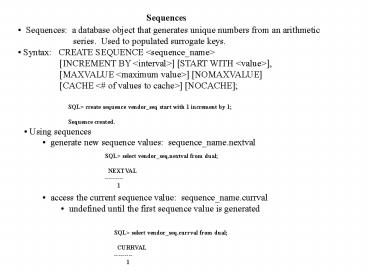Sequences - PowerPoint PPT Presentation
Title:
Sequences
Description:
access the current sequence value: sequence_name.currval ... GLOBAL.mode: the form can be in various modes. enter_query, execute_query, insert, update : ... – PowerPoint PPT presentation
Number of Views:33
Avg rating:3.0/5.0
Title: Sequences
1
Sequences
- Sequences a database object that generates
unique numbers from an arithmetic - series. Used to
populated surrogate keys. - Syntax CREATE SEQUENCE ltsequence_namegt
- INCREMENT BY ltintervalgt
START WITH ltvaluegt, - MAXVALUE ltmaximum valuegt
NOMAXVALUE - CACHE lt of values to cachegt
NOCACHE
SQLgt create sequence vendor_seq start with 1
increment by 1 Sequence created.
- Using sequences
- generate new sequence values
sequence_name.nextval - access the current sequence value
sequence_name.currval - undefined until the first sequence value is
generated
SQLgt select vendor_seq.nextval from dual
NEXTVAL --------- 1
SQLgt select vendor_seq.currval from dual
CURRVAL --------- 1
2
Creating custom forms
- Adding more interface items and making it more
user-friendly - Step0 Connect with the database server
- Step1 Create a non-database block manually
(not using the wizard) - Step2 Create a canvas from object navigator
- Step3 Go to the layout editor
- Step4 Add interface items (buttons, text
items, radio buttons, etc.) - Step5 Change the properties of the interface
items from property pallette - Creating radio buttons
- Step1 Go to the layout editor
- Step2 Select the radio button icon from the
left hand margin and - place it on the canvas
- Step3 From the property palette, change the
name, label, and value - Step4 From the object navigator, select the
radio group - Step5 Change the name, and set a initial value
for the radio group - Creating control buttons (refer to page 190 in
book) - Create buttons
- Change labels
- Change hints (see help property group in
property palette - Create WHEN-BUTTON-PRESSED triggers
3
Layout editor
Radio button Text item Display item
4
(No Transcript)
5
Trigger codes
- CREATE_BUTTON (refer to page 193)
--clear the form CLEAR_FORM --assign form state
to insert GLOBAL.mode 'INSERT' select
itemid_seq.nextval into item_control_block.itemi
d_text from dual
- Explanation
- Global variables are used for form
characteristics - Purpose clear any information in the form
- use the sequence itemid_seq (created previously)
to generate a new - item id
- GLOBAL.mode the form can be in various modes
- enter_query, execute_query, insert, update
- item_control_block.itemid_text an item is
referred to as - block-name.item-name
- dual a dummy table used to complete SQL syntax
6
Trigger code
- SAVE_BUTTON (refer to page 198)
if global.mode 'INSERT' then insert into
item values (item_control_block.itemid_text,
item_control_block.itemdesc_text,
item_control_block.category_radio_group)
global.mode 'UPDATE' elsif global.mode
'UPDATE' then update item set itemdesc
item_control_block.itemdesc_text, category
item_control_block.category_radio_group where
itemid item_control_block.itemid_text end
if commit --clear_form
- The last command (clear_form) is commented so
that you can see the - record after it is saved
- DELETE_BUTTON (see page 209)
--delete the current record delete from ITEM
where itemid item_control_block.itemid_text --
commit the changes commit --clear the
form clear_form
7
Format mask (refer to page 236)
- Purpose to display data in certain formats
- item property set from property palette
Testing the form
- Ids (itemID, LOCID, etc.) should be display
items. - Right now, the form is not ready for querying
- You can only create a new record, and update a
record that you just created - Once you create a record and save it, go to
SQLPlus editor and check if - the record has been posted in the database
- If you get the error message
- FRM40735 WHEN-BUTTON-PRESSED trigger
raised unhandled exception - ORA-01407
- it means that you are trying to enter a null
value to a non-null field - Ignore the message FRM 40401 No changes to
save, but check if the changes - have been made from the SQLPlus editor.































